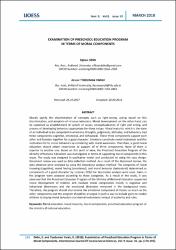| dc.contributor.author | Dıdın, Elifcan | |
| dc.contributor.author | Yaralı, Kevser Tozduman | |
| dc.date.accessioned | 2021-12-12T16:48:59Z | |
| dc.date.available | 2021-12-12T16:48:59Z | |
| dc.date.issued | 2018 | |
| dc.identifier.issn | 2146-1961 | |
| dc.identifier.uri | https://app.trdizin.gov.tr/makale/TXpFeE16QTJOZz09 | |
| dc.identifier.uri | https://hdl.handle.net/20.500.11857/1640 | |
| dc.description.abstract | Morals signify the discrimination of concepts such as right-wrong, acting based on thisdiscrimination, and adoption of virtuous behaviors. Moral development, on the other hand, canbe explained as establishment of system of values, conceptualization of right and wrong, andprocess of developing behaviors appropriate for these values. Moral maturity, which is the stateof an individual to be competent in emotions, thoughts, judgments, attitudes, and behaviors, hadthree components; cognitive, emotional, and behavioral. These three components support eachother and function together for a good character. Emotions constitute moral motivation and thismotivation forms moral behaviors by combining with moral awareness. Therefore, a good moraleducation should attach importance to support all of three components. None of them issuperior to another one. Based on this point of view, the Preschool Education Program of theMinistry of National Education was investigated in terms of supporting moral components in thisstudy. The study was designed in qualitative model and conducted by using the case design.Document review was used as data collection method. As a result of the document review, thedata obtained were analyzed by using the descriptive analysis method. The categories of moralknowing (cognitive), moral feeling (emotional), and moral behavior (behavioral) determined ascomponents of a good character by Lickona (1992) for descriptive analysis were used. Gains inthe program were assessed according to these categories. As a result of the study, it wasobserved that the Preschool Education Program of the Ministry of National Education supportedmoral development of children and involved moral components mostly in cognitive andbehavioral dimensions and the emotional dimension remained in the background more.Therefore, the program should also involve the emotional component of morals as much as theother components and the program should be arranged in such a way to include gains to enablechildren to display moral behaviors via internal motivations instead of authority and rules. | en_US |
| dc.description.abstract | Ahlak; doğru - yanlış, iyi - kötü gibi kavramları ayırt etmek, bu ayrıma göre davranmak ve erdemli davranışları benimsemek anlamına gelmektedir. Ahlak gelişimi ise bireylerin değerler sistemi oluşturma, doğru ve yanlışı kavramsallaştırma ve bu değerlere uygun davranışlar geliştirme süreci olarak açıklanabilir. Bireyin duygu, düşünce, yargı, tutum ve davranışlarında yetkin olma durumu olan ahlaki olgunluğun üç bileşeni vardır: Bilişsel, duygusal ve davranışsal. Bu üç bileşen iyi bir karakter için birbirini deste klemekte ve birlikte çalışmaktadır. Duygular ahlaki motivasyonu oluşturmakta ve bu motivasyon da ahlak bilinciyle birleşerek ahlaki davranışları meydana getirmektedir. Bu nedenle iyi bir ahlak eğitimi programı her üç bileşeni de desteklemeye önem vermelidi r. Hiçbiri bir diğerinden üstün değildir. Bu bakış açısı ile bakılarak yapılan bu araştırmada MEB Okul Öncesi Eğitim Programı, ahlaki bileşenleri desteklemesi açısından incelenmiştir. Araştırma nitel modelde tasarlanmış ve durum deseni kullanılarak yürütül müştür. Veri toplama yöntemi olarak doküman incelemesi kullanılmıştır. Doküman incelemesi sonucunda elde edilen veriler betimsel analiz yöntemiyle incelenmiştir. Betimsel analiz için Lickona (1992) tarafından iyi karakterin bileşenleri olarak belirlenen ah laki bilme (bilişsel), ahlaki hissetme (duygusal) ve ahlaki davranış (davranışsal) kategorileri kullanılmıştır. Programda yer alan kazanımlar bu kategorilere göre değerlendirilmiştir. Araştırmanın sonucunda MEB Okul Öncesi Eğitim Programında çocukların ahl ak gelişimini desteklerken daha çok ahlaki bileşenlerden bilişsel ve davranışsal boyuta yer verildiği, duygusal boyutun daha geri planda kaldığı görülmüştür. Dolayısıyla programda ahlakın duygusal bileşenine de diğer bileşenler kadar yer verilmeli; program çocukların otorite ve kurallardan dolayı değil, içsel motivasyonları yoluyla ahlaki davranışlar göstermelerini sağlayacak kazanımlar içerecek şekilde düzenlenmelidir | en_US |
| dc.language.iso | eng | en_US |
| dc.relation.ispartof | Uluslararası Avrasya Sosyal Bilimler Dergisi | en_US |
| dc.rights | info:eu-repo/semantics/openAccess | en_US |
| dc.subject | Arkeoloji | en_US |
| dc.subject | Sanat | en_US |
| dc.subject | Coğrafya | en_US |
| dc.subject | Tarih | en_US |
| dc.subject | Dil ve Dil Bilim | en_US |
| dc.subject | Hukuk | en_US |
| dc.subject | Müzik | en_US |
| dc.subject | Felsefe | en_US |
| dc.subject | Sosyoloji | en_US |
| dc.title | EXAMINATION OF PRESCHOOL EDUCATION PROGRAM IN TERMS OF MORAL COMPONENTS | en_US |
| dc.title.alternative | OKUL ÖNCESİ EĞİTİM PROGRAMININ AHLAKIN BİLEŞENLERİ AÇISINDAN İNCELENMESİ | en_US |
| dc.type | article | |
| dc.department | Fakülteler, Sağlık Bilimleri Fakültesi, Çocuk Gelişimi Bölümü | |
| dc.identifier.volume | 9 | en_US |
| dc.identifier.startpage | 174 | en_US |
| dc.identifier.issue | 31 | en_US |
| dc.identifier.endpage | 193 | en_US |
| dc.relation.publicationcategory | Makale - Ulusal Hakemli Dergi - Kurum Öğretim Elemanı | en_US |



















